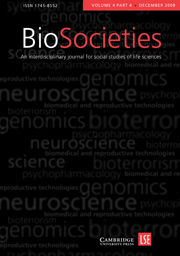Article contents
The Practice of Genetic Counselling—A Comparative Approach to Understanding Genetic Counselling in China
Published online by Cambridge University Press: 22 December 2009
Abstract
This article provides an empirical account of the application of genetic counselling in China based on interviews, clinical observation and literature research during a field study from September 2008 to February 2009, carried out mainly in China and partly in Hong Kong and the United Kingdom. Making comparisons with the situation in the UK and in Hong Kong, and from a social science perspective, the article outlines the situation of genetic counselling in China, discussing the qualifications for genetic counselling providers, the model of genetic clinical services, and their governance and supervision in Chinese social contexts. The article discusses Chinese practitioners’ understanding of and practice around ethical issues such as non-directiveness, informed choice and decision-making, and explores the extent to which this reflects the administrative, political and socio-economic environments in Chinese society. The article argues that the current state of genetic counselling in China arises mainly from its executive governance, non-professional genetic counselling provision, economic conditions and the lack of full healthcare coverage.
Keywords
- Type
- Articles
- Information
- Copyright
- Copyright © London School of Economics and Political Science 2009
References
- 3
- Cited by


